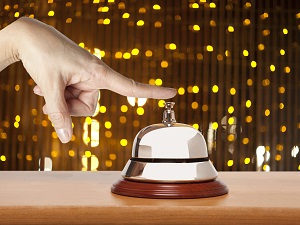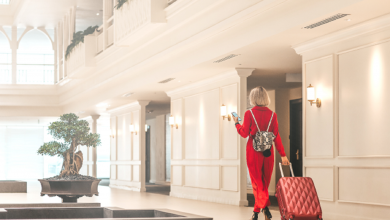
Aligning with a recognised brand
The decision to become a franchisee is a difficult one for any independent accommodation provider as it is fraught with the unknown and has many sides to consider.
Once upon a time, guests opted to stay with recognisable brands because they knew what they would get. Before the dawn of the digital age, travellers had to rely on brand reputation, word-of-mouth, star ratings, or else risk the quality of their stay on an as-yet-undiscovered property.
Of course, independent providers come with a charm all their own and in today’s OTA-laden world they have the opportunity to craft just as much a global brand reputation as any other franchise-based property. All reviews are created equally under law of the internet, after all. So the road to becoming a franchisee is vastly different in 2015. Rather than making it a less viable option for independent properties though, the digital OTA-scape has increased the number of options available to all.
Lest we forget, before there were OTAs, there were star ratings. Both measures of comparison allow guests to weigh up their booking options and in a sense it is the same for the providers themselves. You can boost bookings by taking steps to improve the standard of OTA reviews, or focus on increasing your property’s number of accredited stars, or you can look to a franchise. Each option provides a benchmark for managers to measure the success and growth of their property.
This is valid reasoning for many independent properties around Australia but are there ways one can uniquely benefit from a franchise agreement?
One way involves in-house operations. Organising an effective online marketing strategy and implementing it across social media, OTAs and other web platforms is time consuming and notoriously difficult to perfect. Aligning with a recognised brand that has a targeted strategy ready to apply itself to your property is certainly a selling point.
Larger brands may also have closer working relationships with OTAs and metasearch companies than an independent provider. This may enable a franchise to better negotiate with them as distribution partners and attract guests using a wider net. As a franchisee, properties also benefit from a pool of guests who remain loyal to the global brand with which they are associated. This may prove a much larger benefit if your independent property has historically attracted a lot of business guests.
TFE Hotels was one brand that raised this view when speaking to AMG. CEO Rachel Argaman said: “We view OTAs and also metasearch companies as important distribution partners. They supply us with clients and the onus is then on us to ensure those guests book direct with us the next time. We run a sophisticated nett RevPAR (net revenue per available room) model which monitors our channels to see which ones are providing rooms at the highest nett RevPAR and we allocate rooms accordingly.”
AccorHotels’ vice president of franchise operations Lindsay Leeser also noted: “We have the strength in numbers and therefore have negotiated very competitive commission rates that benefit our franchisees and other hotel owners.”
On the other hand, retaining guest loyalty will always remain the responsibility of the accommodation provider itself, no matter what brand they are associated with. If their stay exceeds expectations, guests will be more likely to repeat their visit and recommend the property both online and to their friends.
Expectation is key. If expectations for a property are too high, it’s much harder to exceed them.
The temptation when marketing a piece of accommodation online, or anywhere for that matter, is to romanticise it, making it sound more impressive than it is. However, the more realistic the expectations going in, the easier it will be to avoid disappointing (and then to impress) guests. With a franchising agreement, these guest expectations are pre-ordained and pre-managed. As a franchisee, there is no ambiguity or confusion surrounding guest expectations. There are very specific standards in place that, when maintained, will meet those guest expectations at every turn. So anything an accommodation provider does to go above and beyond those expectations will hit home.
Typical guest expectations for a franchised property will usually involve standardised services like mattress quality, free wifi, room service or convenience food, particular amenities, etc. Some of these are things that can be more difficult for independent properties to provide off their own bat. Free wifi in particular is something that can be expensive and difficult to manage but is made easier by having a third-party or franchisor supporting it.
In the end, that is the draw of a franchising agreement: it allows independent properties the chance to market themselves and offer services they wouldn’t otherwise be able to afford or have the time to implement.
It is not for everyone though, the franchises themselves are the first to admit that. There is a lengthy selection process for every brand looking to acquire new franchisees.
TFE Hotels weighs in on benefits of franchising
This criteria was something TFE Hotels CEO Rachel Argaman spoke about when approached for comment by AMG. “TFE Hotels considers the following: proposed design and level of finish of the hotel product, either existing or to be developed; whether we consider there are adequate demand drivers for the specific location of the hotel; the most suitable brand for the location, taking the demand drivers into account; the ownership structure, and; whether the new property location conflicts or complements existing TFE Hotels.”
When asked whether the current marketplace is better suited to franchise brands than independent brands, Ms Argaman said: “There is no single right or wrong answer to this question. It depends on the product, the location and the ability of the owner to operate. If the hotel is truly unique in terms of location and product, it is possible for a hotel to be independently operated without a brand.
“Without this uniqueness, having a brand associated with the hotel should provide a better overall return to the owner. Whether this is done via a franchise or via a more traditional operating agreement depends on the owner’s objectives and abilities. There is a lot to be said for selecting an operator to run the hotel, which frees up the owner to focus on those things which have already provided them with the ability to own a hotel. The owner does not need to be concerned with the day to day administration and HR issues which arise under the franchise model. In addition, large hotel management companies such as TFE Hotels are able to use their significant sales and marketing relationships, websites, databases, contracts and leverage to drive revenue to the hotel.
“An option on the opposite side of the spectrum, besides its own brands (Adina, Medina, Vibe, Rendezvous and Travelodge), TFE Hotels also operates hotels for owners under independent brands through its TFE Hotels Collection sub-brand, using its centralised services model to provide superb distribution, plus all the accounting, sales & marketing, human resources, operational supervision and procurement.”
“We are considering franchising our Medina Serviced Apartments brand in the near future.”
AccorHotels weighs in on benefits of franchising
With 86 franchise hotels in Australia, AccorHotels also had valuable insight to share with AMG. Vice president of franchise operations for AccorHotels Pacific Lindsay Leeser said: “The benefit of hoteliers aligning with AccorHotels is that they gain access to our global distribution platform and our loyalty programs – Accor Plus and Le Club AccorHotels, as well as a globally recognised brand.”
In terms of a criteria for selecting new franchisees, Mr Leeser revealed: “We consider a broad variety of property types and sizes, from small boutique hotels to large 200+ room resorts when looking to expand our franchise network. With our portfolio of brands covering all segments from luxury to economy it’s not difficult to find the right branding for most independent operators.
“Each brand has a strict validation process with criteria the hotel needs to meet either prior to or within a set time frame after signing a franchise agreement. Location, property type and guest reviews are also taken into account before a property would join the network.”
When asked whether the current marketplace is better suited to franchise brands than independent brands, Mr Leeser said: “As independent hotel operators are often situated in suburban and regional areas, they can be heavily reliant on a number of market segments to make their businesses profitable.
“When market conditions shift or there is a downturn, it can be very challenging for operators to contain their costs – that’s why a franchising model with an internationally recognised brand combined with the strength of the group’s global distribution and loyalty programs, can assist independent operators to capture new business while maintaining their own operational management style.
“Typically our franchising growth has been in conversion from existing properties, and now we’re seeing franchise owners, new and existing, partnering with us in the new-build space. Elements of Byron that is currently under construction in Byron Bay is a prime example of this and it will join our MGallery Collection brand. We are targeting to expand our franchise network from some 85 hotels to 100 hotels over the next two years.”
Quest weighs in on benefits of franchising
Zed Sanjana, CEO at Quest Serviced Apartments, also spoke with AMG about the criteria used to select new franchisees. He said: “We get a lot of inbound inquires, about a third of which are internally generated – organic opportunities from prospective franchisees that are already in the system through existing franchisee staff or corporate office staff who then go on to become franchisees. About another third comes from people who have owned businesses before or are looking for a career change or looking to get out of the type of industry that they’re in. The last third is probably more experienced accommodation industry operators who have either worked in, owned, or ran accommodation businesses.”
When asked whether the current marketplace is better suited to franchise brands than independent brands, Mr Sanjana said: “I think we’re moving into a period where technology’s evolving quite significantly. As an accommodation operator, it’s becoming increasingly important to develop relationships with your guest and your customer, and ensure that they have loyalty with you.
“Now that opportunity is more limited if you’re an independent because an independent is one property – you may not get traction – whereas if you have a network of 150 properties, there is a need for inventory that spreads across your network and so it’s much easier for us to be able to put our franchisees in a position where they can access the customer base and then ultimately once that access is provided it’s down to the franchisee like with any business to ensure that they build loyalty with their guest by ensuring a good guest experience when they arrive and they return.”
Mr Sanjana added that he has not found that OTAs account for a significant amount of business within Quest. “We have an ongoing dialogue of communication with the OTAs but the OTAs aren’t a big part of the business. A lot of our business is direct, the vast majority of our business is direct so I think the online travel agents have a place in the market and are very important to certain types of businesses particularly if you look at new businesses in their infancy, when they’re ramping up, they’re critically important in those times.”
ARRA Accommodation Group weighs in on benefits of franchising
Tony Sheer, general manager at ARRA, also spoke with AMG about the criteria used to select new franchisees. He said: “The property must meet a three-star standard and its website reviews are monitored.”
When asked whether the current marketplace is better suited to franchise brands than independent brands, Mr Sheer said: “Given the growing concern about OTAs we have seen a stronger interest in branding for reliable pricing. The fact that we have an ARRA branded website has seen a 30 percent growth over the past 12 months. The commission on this website is only five percent.”
On the topic of OTAs, he added: “We act on behalf of our members with the OTAs, helping them to get exposure, update content scores, property information and maximise their return.
“We have a channel manager as part of their membership package. This channel manager is called UseROSS and is designed from the moteliers point of view not that of an OTA. Social media, web design, 24 hour IT support, supplier contacts, corporate marketing and accounts, advice on motel operations, relief management contacts and a friendly voice at the end of the phone to support and assist in every day operations.”

AccomNews is not affiliated with any government agency, body or political party. We are an independently owned, family-operated magazine.







